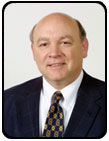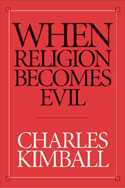Charles Kimball’s ‘When Religion Becomes Evil’ says need for religion persists, despite corruption
 For all the horror they produced, the terrorist attacks of Sept. 11 also created an extraordinarily teachable moment, says Charles Kimball, Wake Forest University religion professor and internationally-known expert on Islam and the intersection of religion and politics. Kimball turned the teachable moment into a book to be published on the one-year anniversary of the attacks— “When Religion Becomes Evil.”
For all the horror they produced, the terrorist attacks of Sept. 11 also created an extraordinarily teachable moment, says Charles Kimball, Wake Forest University religion professor and internationally-known expert on Islam and the intersection of religion and politics. Kimball turned the teachable moment into a book to be published on the one-year anniversary of the attacks— “When Religion Becomes Evil.”
No religion is free from the possibility of corruption, Kimball says, but all have the ability and means to overcome it. He hopes “When Religion Becomes Evil” will stimulate constructive discussion on religion’s function in the world.
 The 256-page book, published by HarperSanFrancisco, presents the terrorist attacks as an unambiguous illustration of religion being used for evil and destructive purposes. Kimball, who was tapped as an expert by numerous national and international media during the coverage following Sept. 11, says despite the religious corruption that often makes headlines, religion still provides the best hope for the future.
The 256-page book, published by HarperSanFrancisco, presents the terrorist attacks as an unambiguous illustration of religion being used for evil and destructive purposes. Kimball, who was tapped as an expert by numerous national and international media during the coverage following Sept. 11, says despite the religious corruption that often makes headlines, religion still provides the best hope for the future.
“We need to recover what is best and healthy in all religious traditions,” says Kimball, chair of Wake Forest’s religion department. “As flawed as they can be, religious traditions and institutions are absolutely necessary in an increasingly interdependent world community.”
Kimball, an ordained Baptist minister and the grandson of a Jewish immigrant and a Presbyterian, says common belief in slight variations of the two greatest commandments— love for God and love for others—is universal in the major religions. Corruption begins when either of these two commandments is broken in the name of the religion, he says.
The book dedicates a chapter to each of what Kimball suggests are the five major warning signs that a religion is being used for corrupt reasons, and offers steps to overcoming them. The signs are: claims of absolute truth; blind obedience; establishing the “ideal” time, especially with Armageddon scenarios; when the end justifies any means; and declaring holy war.
Kimball uses contemporary and historical events and people to illustrate each of the warning signs. Current examples include the terrorist actions of Sept. 11 and the sexual abuse scandal in the Catholic Church, where church leaders often let known sex offenders continue to work in the church. Kimball says those leaders believed that the end goal of protecting the institution justified the means— in essence ignoring an epidemic of sexual abuse in the church.
Historically, the Christian Crusade beginning in the 11th century was “far from being just a war declared by the king, the Crusade was a war instigated by the church,” Kimball writes in the chapter “Declaring Holy War.” Using cults and sects to illustrate blind obedience, Kimball recalls the hundreds of Jim Jones followers who became victim to a mass murder-suicide in the late 1970s.
“Religion is an extremely powerful force,” says Kimball. “It can inspire people to their highest and noblest, but religion has also been used as justification for some of the worst events in history.”
Kimball is also the author of “Striving Together: A Way Forward in Christian-Muslim Relations and Religion,” “Politics and Oil: The Volatile Mix in the Middle East” and “Angle of Vision: Christians and the Middle East.” He has written articles for numerous publications, including The Christian Century, The Los Angeles Times and The Christian Science Monitor.
During the week of Sept. 11, Kimball is speaking at several commemorative events in New York City and Washington, D.C., including a public event at the National Cathedral.
Categories: Research & Discovery, University Announcements
Media Contact
Wake Forest News
media@wfu.edu
336.758.5237



